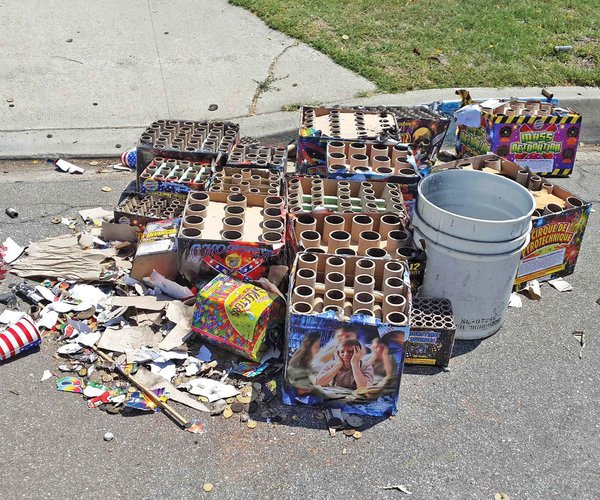The Ceres City Council voted 3-2 Monday to amend developer agreements struck last year with three medical cannabis businesses in response to changes in regulations made by state lawmakers. The move essentially opens the door for medical cannabis operations to sell product for adult use to remain successful as the city finds marijuana as a cash cow for its coffers.
The city expects to receive a minimum of $130,000 per month from the three cannabis operators in Ceres. That amount could be higher depending on the success of sales.
In May 2017 city officials chose to allow a medical cannabis growing operation in an industrial area via a developer agreement that spells out the payment of whopping fees to the city. In October the council approved a developer agreement to allow Pacafi Cooperative to operate a 6,000-square-foot Patient Care First dispensary at 1442 Angie Avenue. Lastly, in November it approved Mike Reynolds' Kase's Journey dispensary at 4030 Farm Supply Drive in an industrial area in southwest Ceres. All agreements spell out how the city is to be paid an exorbitant fee each month.
Those agreements were made before the state fine-tuned regulations in light of Prop. 64 approved by California voters in November 2016. City Manager Toby Wells said the state drafted emergency regulations and spent all of 2017 coming up with a framework to be in place by Jan. 1, 2018. Initially the "emergency" regulations called for similar licensing for medical and adult use cannabis businesses.
In January the Ceres City Council voted 3-2 to consider allowing adult-use, or recreational, cannabis operations. Mayor Chris Vierra and Councilmembers Ken Lane and Bret Durossette formed the majority opinion that two already-approved medical dispensaries should be able to sell marijuana to recreational users. Vice Mayor Mike Kline and Councilwoman Linda Ryno didn't support the concept.
Wells explained that the developer agreement changes are essential to making the operators successful by eliminating the medical-only aspect of the operations.
The changes to the agreements also allow all three operators to hold a distributor license to allow them to package products labeled either with an "M" for medical and "A" for adult use. Wells said a distributor license gives the operations more flexibility as to how they control the product in the supply chain as it moves from cultivator to distributor to dispensary, who is doing the distribution can shift, based on that license type.
"We do believe will help them to be even more successful than they're already being," said Wells.
In May 2017 the council approved a medical marijuana manufacturing facility for an industrial area in southwest Ceres. The developer agreement for Kase Manufacturing at 4111 Brew Master Drive, calls for the business to pay the city fees of $50,000 per month during the first year. The fee increases to $75,000 per month in the second year (starting May 2018) and $100,000 per month in the third year (starting May 2019).
Also on Monday, the council approved an annual review of the development agreement with Kase Manufacturing but Wells said Reynolds has upheld all of his obligations, has made payments on time and is a model citizen. He said the facility is clean and has been open to city staff for inspection.
"They are definitely a model corporate citizen for us and we are very pleased that they have chosen to be here and they're someone we will continue to look forward to doing business with," said Wells.
While cannabis is legal in certain states like California and Colorado, its use is still against federal law but attitudes are shifting. Several months ago, Attorney General Jeff Sessions signaled that his Department of Justice would go after the states and their ability to license marijuana businesses. However, President Trump said he fully supports the states' rights to do whatever they would like with cannabis.
Wells said the city will also benefit from receiving a portion of the sales tax generated by adult-use cannabis transactions.
On Monday, Ryno and Kline voted no to adult-use dispensaries.
Reynolds spoke to the council and expressed appreciation to the city to allow him "to make my son's medicine here." He said his products are helping children with medical conditions all over the state. Reynolds said doctors at Stanford Medical Center and University of California San Francisco Medical Center are referring families to products he grows and processes in Ceres.
Reynolds said he believes cannabis is the only product that has given his son "quality of life." He said Kase, who was born with chromosome 5q14.3 deletion syndrome, a neurocognitive disorder characterized by epilepsy and intellectual disability, went from 1,000 seizures a day to five to 10 because of cannabinoids extracted from marijuana.
He said an FDA study has been fast-tracked for CBD to be prescribed legally.
"I hope that we continue to show that we can be a positive contributor to the city of Ceres and I continue to hope that as we go down the line that you'll look back and say ‘this was a good opportunity for use,' not so much for revenue but because of what we're really doing on a medical stance," said Reynolds.
He said the cannabis industry is in a state of uncertainty as the "black market is thriving right now because of the high taxes."
City officials recently signaled that they may consider eliminating the developer agreement fees in lieu of a cannabis sales tax. Wells told the Planning Commission last month that the city will "monitor that the conditions are right for them to continue to be in business and be successful in business."
Kline said he could not support adult-use sales in Ceres.
Ryno said while she is glad children are benefitting from medical cannabis products but cannot support recreational pot sales.
"I do not want to see adult-use dispensaries in the city," said Ryno, "and maybe we have not seen any problems yet but I just unfortunately think we're going to."
In January Ryno asked if the city was being greedy for the revenue and "selling the soul of the city for money?"
Councilman Bret Durossette sees things differently.
"The tax base that we're getting is incredible," said Durossette. "This is the first time that we're going to have a budget that we're in the positive and it's because of marijuana use. If it's not being sold here, they can go on the other side of Modesto four miles away ... and get it."





